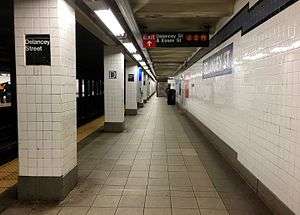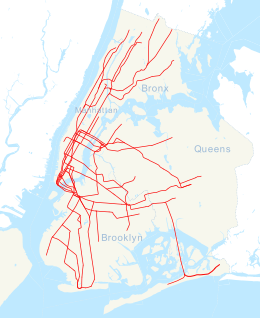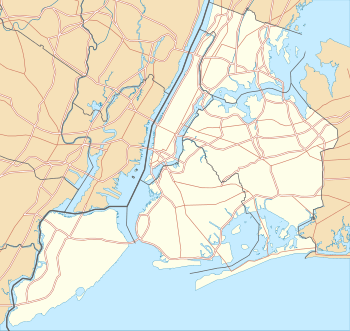Delancey Street–Essex Street (New York City Subway)
| Delancey Street–Essex Street | |||||||||||
|---|---|---|---|---|---|---|---|---|---|---|---|
| New York City Subway rapid transit station complex | |||||||||||
|
Stair at southeast corner of Essex and Delancey | |||||||||||
| Station statistics | |||||||||||
| Address |
Delancey Street & Essex Street New York, NY 10002 | ||||||||||
| Borough | Manhattan | ||||||||||
| Locale | Lower East Side | ||||||||||
| Coordinates | 40°43′07″N 73°59′18″W / 40.71851°N 73.988199°WCoordinates: 40°43′07″N 73°59′18″W / 40.71851°N 73.988199°W | ||||||||||
| Division | B (BMT/IND) | ||||||||||
| Line |
IND Sixth Avenue Line BMT Nassau Street Line | ||||||||||
| Services |
F J M Z | ||||||||||
| Transit connections |
| ||||||||||
| Structure | Underground | ||||||||||
| Levels | 2 | ||||||||||
| Other information | |||||||||||
| Opened | July 1, 1948 | ||||||||||
| Wireless service |
| ||||||||||
| Traffic | |||||||||||
| Passengers (2015) |
8,226,975 (station complex)[2] | ||||||||||
| Rank | 46 out of 422 | ||||||||||
| |||||||||||
| |||||||||||
Delancey Street–Essex Street is a station complex shared by the BMT Nassau Street Line and the IND Sixth Avenue Lines of the New York City Subway, located at the intersection of Essex and Delancey Streets on the Lower East Side of Manhattan, just west of the Williamsburg Bridge.
It is served by the:
- F and J trains at all times
- M train at all times except late nights
- Z skip-stop train during rush hours in the peak direction
In addition to the two track levels—the BMT platforms are on the upper level and the IND platforms are on the lower—an intermediate mezzanine built for the IND platforms provides the passenger connection between the two lines. As the BMT and the IND were originally separate systems, the transfer passageway was not within fare control until July 1, 1948. The full-time entrance is on the north side of Delancey Street, on either side of Essex Street.
Station layout
| G | Street level | Exit / entrance |
| B1 | North mezzanine | Fare control, exits/entrances |
| Side platform, doors will open on the right | ||
| Westbound[note 1] | ← ← | |
| Center track[note 1] | → → | |
| Island platform, doors will open on the left, right | ||
| Eastbound[note 1] | → → | |
| Trolley trackways | Emergency exit, planned Lowline | |
| B2 | South mezzanine | Fare control, exits/entrances |
| B3 | Side platform, doors will open on the right | |
| Northbound | ← | |
| Southbound | → | |
| Side platform, doors will open on the right | ||
Exits
| Exit location | Number of exits |
|---|---|
| NW corner of Delancey Street and Essex Street | 1 |
| SW corner of Delancey Street and Essex Street | 1 |
| NE corner of Delancey Street and Essex Street | 2 (1 HEET exit-only) |
| SE corner of Delancey Street and Essex Street | 2 (1 HEET exit-only) |
| NW corner of Delancey Street and Norfolk Street | 1 |
| NE corner of Delancey Street and Norfolk Street | 1 |
BMT Nassau Street Line platforms
| Essex Street | |||||||||||||||||||
|---|---|---|---|---|---|---|---|---|---|---|---|---|---|---|---|---|---|---|---|
| New York City Subway rapid transit station | |||||||||||||||||||
|
Westbound platform | |||||||||||||||||||
| Station statistics | |||||||||||||||||||
| Division | B (BMT) | ||||||||||||||||||
| Line | BMT Nassau Street Line | ||||||||||||||||||
| Services |
J M Z | ||||||||||||||||||
| Platforms |
1 island platform cross-platform interchange 1 side platform | ||||||||||||||||||
| Tracks | 3 | ||||||||||||||||||
| Other information | |||||||||||||||||||
| Opened | September 16, 1908[3] | ||||||||||||||||||
| Former/other names | Delancey Street | ||||||||||||||||||
| Station succession | |||||||||||||||||||
| |||||||||||||||||||
| |||||||||||||||||||
Essex Street on the BMT Nassau Street Line has three tracks, one side platform, and one island platform. The side platform is used by trains coming from the Williamsburg Bridge. The other two tracks serve the island platform. The middle track, which was formerly the peak-direction express track, is now used for outbound J and Z trains over the Williamsburg Bridge on weekdays and late nights, as well as short turning weekend M trains.
After a 2004 reconfiguration, the former northbound local track was taken out of regular service. It was only used for special reroutes from Chambers Street until 2010. The Chrystie Street Connection between Broadway–Lafayette Street and Essex Street was not used for regular revenue service from 1976 to 2010. On June 28, 2010, with the re-routing of M trains to the IND Sixth Avenue Line and IND Queens Boulevard Line, the connection again saw regular use for those aforementioned trains only. On June 8, 2014, another service reconfiguration occurred with the extension of weekend M trains. On weekdays, outbound M trains coming from the Chrystie Street Connection stop on the outer local track while outbound J and Z trains from Broad Street use the center track. On weekends, the configuration is reversed; since M trains short-turn at Essex Street on the center track, all J trains stop at the outer track.
This station is a bottleneck for eastbound trains, which are frequently delayed momentarily at this station because the two eastbound tracks merge into one track before crossing the Williamsburg Bridge.
History

_(14573701189).jpg)
Next to the Brooklyn-bound local track is a closed trolley terminal, which was built along with the subway station and opened several months earlier. There are about three to four tracks against a wall and eight turning loops, which were used for trolley service from 1908 to 1948 that traveled over the Williamsburg Bridge to different parts of Brooklyn.[4][5][6]
The underground terminal for the subway adjacent to the trolley terminal opened on September 16, 1908. The station originally contained only two tracks which ended at the west end of the station. It also had an additional southern side platform adjacent to the trolley terminal, with the station organized in a Spanish solution.[4] The station was rebuilt for through service from 1911 to 1913 in order for the Centre Street Subway to extend to Chambers Street. The rest of the subway line has four tracks while there was room at Essex Street station for only three tracks and two platforms. There is provision for a fourth track to run through the trolley terminal area and join the subway west of the trolley terminal, should a four-track subway station be wanted.
For many years, the elevated train service was very intensive and a fourth track at Essex Street would have been useful to handle the crowds, but at the same time the trolley service was also well patronized, so no expansion was ever proposed. This would have added a second side platform to the south of the southernmost track, directly against the trolley terminal. The island platform would have been demolished to make room for the fourth track; alternatively, the fourth track would have been constructed adjacent to the southernmost track, resulting in a 2 side-platform, 1 island-platformed station.
After streetcar service ended in 1948, the former track area on the south side of the bridge was rebuilt into auto lanes with a new ramp from street level closing off the former downhill ramp to the trolley terminal.[7][8] The trolley terminal itself, however, was left vacant, and small portions were converted to storerooms and an emergency exit. The vacant space is the proposed location of the Low Line, a planned underground park.[9] Prior to 1913, the BMT station was also known as Delancey Street.
Image gallery
-
-
-
-

Abandoned trolley terminal
-

Abandoned trolley terminal
IND Sixth Avenue Line platforms
| Delancey Street | |||||||
|---|---|---|---|---|---|---|---|
| New York City Subway rapid transit station | |||||||
 | |||||||
| Station statistics | |||||||
| Division | B (IND) | ||||||
| Line | IND Sixth Avenue Line | ||||||
| Services |
F | ||||||
| Platforms | 2 side platforms | ||||||
| Tracks | 2 | ||||||
| Other information | |||||||
| Opened | January 1, 1936 | ||||||
| Station succession | |||||||
| Next north |
Second Avenue: F | ||||||
| Next south |
East Broadway: F | ||||||
| |||||||
Delancey Street on the IND Sixth Avenue Line has two tracks and two side platforms. The station has a part-time booth on the south side of Delancey Street and has two street staircases. Crossovers connect both platforms to the BMT platforms, which are above and perpendicular to the IND platforms. There were formerly exits at both the north end of the station at Rivington Street and the south end at Broome Street. Twelve staircases, six on each side, led to the Rivington and Broome Street exits. They were all removed. Only the staircase at the southeast corner of Rivington and Essex Streets remains, but it is only used for storage. This staircase is easily identifiable, as it is adjacent to the rear of the Essex Street Market building. The tile band (purple with black border) and station name tablets have been replaced, replicating the style of the original design. In a departure from the norm of recent restorations, every other column at platform level has a large "D" for the station name.
There are two large wall-sized pieces of artwork, one on each wall where the staircase exits and transfers are located. The artist for both glass mosaics is Ming Fay (2004).
The artwork on the downtown side is titled Shad Crossing and details two giant shad fish swimming, along with another wall mosaic of blue waters. In the late 19th century, shad were found along the Hudson River when new immigrants came to New York, many of whom settled on the Lower East Side. The new staircase to the relocated full-time booth also has another painting of a shad wrapped around the bottom of the stairs.
The uptown side is titled Delancey Orchard and has a cherry orchard tree mosaic, which symbolized the tree owned by the Delancey family in the 18th century. Miniature versions appear along all staircases leading from the Delancey Street platforms to either fare control.
Notes
- 1 2 3 The railroad direction here is a Wrong-way concurrency between the J Z trains and the M train.
References
- ↑ "NYC Subway Wireless – Active Stations". Transit Wireless Wifi. Retrieved 2016-05-18.
- ↑ "Facts and Figures: Annual Subway Ridership". Metropolitan Transportation Authority. Retrieved 2016-04-19.
- ↑ New York Times, Mayor Runs a Train Over New Bridge, September 17, 1908, page 16
- 1 2 "Underground Bridge Terminal in New York for Brooklyn Surface and "L" Lines". Street Railway Journal. 31 (15): 592–596. April 11, 1908. Retrieved 21 October 2016.
- ↑ http://www.columbia.edu/~brennan/abandoned/WillB.newphoto.jpg
- ↑ "Mayor Drives Trolley Car: He Inaugurates the Service Across Williamsburg Bridge Into Subway". The New York Times. May 19, 1908. Retrieved 21 October 2016.
- ↑ "Buses Take Over Williamsburg Run: Trolleys End Bridge Service-Old Underground Station No Longer in Use". The New York Times. December 6, 1948. Retrieved 21 October 2016.
- ↑ "Williamsburg Bridge Trolleys Bow to Buses After 44 Years". Brooklyn Daily Eagle. December 5, 1948. p. 5. Retrieved 21 October 2016 – via Newspapers.com.
- ↑ "The Low Line Gets Real at Essex Street Market". thelodownny.com.
External links
| Wikimedia Commons has media related to Delancey Street – Essex Street (New York City Subway). |
|
|
Subway station:
- nycsubway.org – BMT Nassau Street Line: Essex Street
- nycsubway.org – IND 6th Avenue: Delancey Street
- Station Reporter – Delancey Street/Essex Street Complex
- MTA's Arts For Transit – Delancey Street–Essex Street
- Delancey Street and Essex Street entrance from Google Maps Street View
- Delancey Street and Norfolk Street entrance from Google Maps Street View
- IND platforms from Google Maps Street View
Trolley terminal:
- Abandoned Stations – "Williamsburg Bridge Railway terminal". Joseph Brennan, Columbia University, 2001.



